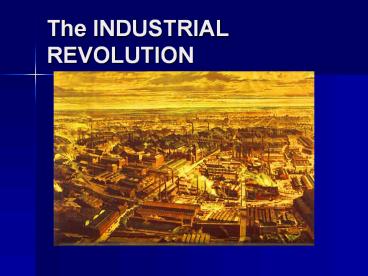The INDUSTRIAL REVOLUTION - PowerPoint PPT Presentation
1 / 26
Title: The INDUSTRIAL REVOLUTION
1
The INDUSTRIAL REVOLUTION
2
KEY QUESTIONS
- What changes were occurring in 18th century
Europe, and why did they bring about the
Industrial Revolution? - What advantages did Great Britain have over the
rest of continental Europe that allowed for
Britain to become the first to industrialize? - How does the Industrial Revolution relate to
society today?
3
What is an Industrial Revolution?
- Industrial Revolution is a major shift of
technological, social, economic, and cultural
conditions in the 18th century - Mechanization is the use of machines to replace
manual labour or animals and can also refer to
the use of powered machinery to help a human
operator in some task
4
Manufacturing Domestic Industry
- 18th century- large industry of manufacturing
textiles by hand and at home - Domestic Industry was manufacturing items in the
countryside
5
EarlyINDUSTRIALIZATION
- saw the spread of domestic system of
manufacturing
6
Growth of Manufacturing
- depended on 3 interrelated factors
- population growth
- agricultural productivity
- transportation
7
Demographic Explosion
- 18th century- Europes population rising because
of - - life expectancy rising
- - less disease and epidemics
- - less warfare
- - larger families
8
(No Transcript)
9
Growth in Agriculture
- 17th century- new methods of agriculture
increased farm yields - more land was under cultivation, and
- farm profits were invested in agriculture and
manufacturing
10
Transportation
- Railroad building led to industrial development
and more jobs - Steamboats revolutionized travel and transport,
and - Roads were improved.
11
Inventions and Manufacturing
- Between 1660 and 1760, 210 new inventions were
patented in England - Innovations in the technology of cotton
production led to an increasing supply of raw
cotton
12
Inventions and Manufacturing
- John Kay's Flying Shuttle (1733)
- John Hargreaves' Spinning Jenny
- (1764)
13
MoreInventions
- Richard Arkwright's
- water frame
- (1769)
- Samuel Crompton's
- spinning mule
- (1779)
14
Inventions and Manufacturing
- James Watt's steam engine (1776)
- Edmund Cartwright's
- mechanized loom (1780s)
15
Britain as the Leader
- Britain was the first to undergo the Industrial
Revolution which later spread throughout Europe - No single explanation why Britain was first
16
Why Was Britain First to Industrialize?
- Established Colonial Empire meant a market for
goods - Geography led to transportation infrastructure
- Agriculture revolution in place
- Economic and Political Infrastructure was in place
17
Established Colonial Empire Meant a Market for
Goods
- Mercantilism in place
- Many colonial areas under British rule
- Strong position in Latin America and Africa
18
Geography led to Transportation Infrastructure
- Was cheaper to ship goods by water
- No part of England was more than 20 miles from
water - 1770s saw canal building boom
- No internal tariffs within country to hinder trade
19
Agricultural Revolution in Place
- 2nd only to Dutch farm productivity
- Climate established to change techniques
- Avg. family had income left over for purchases of
manufacturing products - Enclosure had freed up many farm labourers for
work in new factories - These new workers were fairly mobile and could
move to the new factories
20
Economic and Political Infrastructure was in Place
- Had a central bank
- Well developed credit market
- Government let the domestic economy operate
freely - Stable and predictable government in place since
1688
21
Transformation of Workers
- What happens to people when they go through an
economic change? - Factory soon became the symbol of the new
industrial age in England - Many workers did not pass through the Industrial
Revolution in a direct and immediate form
22
Mechanization of Human Beings
- Manual labour replaced by machines
- Division of labour accentuated
- Specialization of manufacturing tasks
- Working class labourers in the new factories
23
Industrial Revolution Then and Now?
- Can you see a link between the Economic changes
that took place then and economic changes taking
place now? - What comparisons and differences can you make?
24
What jobs are becoming More Popular?
25
New Occupations New Educational Requirements?
26
(No Transcript)































